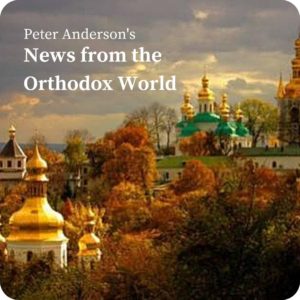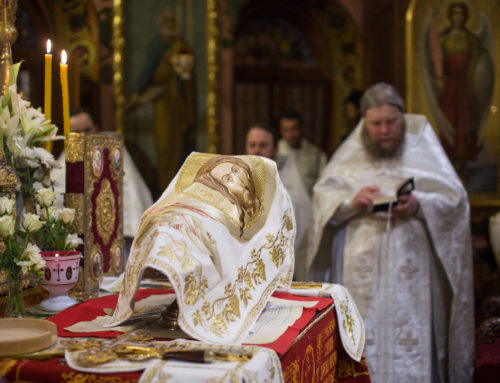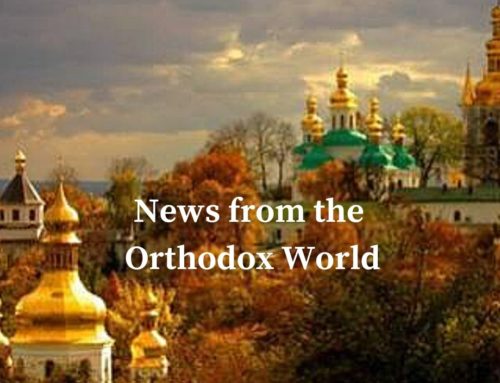
Peter Anderson reports from the Orthodox world.
Longstanding reporter of the news from the Eastern Church, Peter Anderson shares our dream of a unified Christianity. His love for Orthodoxy has driven him to this personal mission to share the news of East with the world through his email list. The Urbi et Orbi Foundation is proud to share his efforts and his insights with you.
The Holy Synod of the Moscow Patriarchate met in Moscow on September 23 and 24. The official minutes of the meeting can be read at https://www.patriarchia.ru/db/text/5837973.html . Journal entry 61 relates to “the consequences of the concelebration of the Primate of the Patriarchate of Alexandria with the head of the schismatic structure operating in Ukraine.” This journal entry first gives a factual recital of prior statements by Patriarch Theodoros of Alexandria supporting the UOC-MP and then his subsequent actions recognizing the OCU and concelebrating with its primate. The recital acknowledges that to date “none of the bishops of the Alexandrian Orthodox Church has expressed disagreement with the actions of Patriarch Theodoros to support the schism in Ukraine.” On the other hand, the recital states that after the recognition by Theodoros “the Russian Orthodox Church began to receive numerous applications for admission to the jurisdiction of the Moscow Patriarchate from the clergy of the Alexandrian Church who did not agree with the decision of Patriarch Theodoros to recognize the Ukrainian schismatics and for this reason did not want to remain under his omophorion.” Although the Moscow Patriarchate did not take action on these applications earlier in the hope that the Alexandrian Patriarchate would reconsider its decision, Patriarch Theodoros according to the recitals went further and concelebrated with the head of the OCU on August 13, 2021.
Accordingly, the Holy Synod resolved as follows:
- Express deep sorrow over the fact that Patriarch Theodore of Alexandria participated in concelebration with the head of the schismatic structure operating in Ukraine, which further deepens the split between our Churches.
- Taking into account the above and taking into account the numerous appeals of the clergy of the Orthodox Church of Alexandria to His Holiness Patriarch Kirill of Moscow and All Rus with a request to accept them under the omophorion of the Moscow Patriarchate, instruct His Grace Archbishop Leonid of Vladikavkaz and Alania to submit proposals to Holy Synod to study thoroughly the appeals received.
Perhaps to give Archbishop Leonid more time to do this work, paragraph 3 of this Journal entry relieves him of certain other work and assigns him to Moscow.
In reporting on this resolution, the Russian news agency Interfax has stated: “Metropolitan Leonid who is also deputy head of the Department for External Church Relations of the Moscow Patriarchate said in November 2020 the number of Alexandria clergy who wished to come under the omophorion of the Russian Orthodox Church was ‘in the hundreds.’” With respect to specifics, there was a letter posted in December 2019 in which a group of 27 priests, who identify themselves as being “African priests” of the Patriarchate of Alexandria, have written an open letter that they “do not agree” with the decision of the Patriarchate to recognize the OCU. https://orthochristian.com/126449.html The signers consist of 19 priests from Tanzania, 4 from Kenya, 3 from Uganda, one from Zambia. They state that as far as they know, the “decision was made without asking the opinion of the African clergy,” who “make up the majority of clergy and parishioners of the Patriarchate.” In April 2021, Metropolitan Hilarion stated: “Indeed, we have received individual and mass requests from clerics from different countries in Africa.” https://mospat.ru/en/news/86955/
In December 2019, the Holy Synod had withdrawn six Russian Orthodox parishes in Africa from the jurisdiction of the Patriarchate of Alexandria. https://ria.ru/20191227/1562961304.html If the Moscow Patriarchate does in fact take one hundred or more African parishes under its jurisdiction in the future, we will not only have two competing Orthodox churches in Ukraine, but two competing Orthodox churches for the entire African continent. It remains to be seen how many African priests who expressed an interest in Moscow’s jurisdiction a year or so ago are still interested in making the change. It will also be interesting to see whether a Moscow Patriarchate church in Africa will seek to established a church where native Africans constitute most of the bishops and priests without any significant Greek influence. All of this could be greatly divisive to the Orthodox world. Is the creation of further divisions the way to solve the division in Ukraine? Perhaps Moscow hopes that the threat of establishing an African church will cause other Local Orthodox Churches to rally to Moscow’s side and hold a second Amman-type meeting of church leaders.
The Holy Synod at its September 23-24 meeting also condemned the visit of Ecumenical Patriarch Bartholomew to Kyiv. In Journal entry 60, the Holy Synod resolved:
- To recognize the arrival in Kiev of Patriarch Bartholomew of Constantinople with his accompanying persons without an invitation from the Patriarch of Moscow and All Rus, Metropolitan of Kiev and All Ukraine Onufry, and the legitimate hierarchs of the Ukrainian Orthodox Church as a gross violation of the canons, in particular, the 3rd canon of the Sardinian Council and 13thrule of the Council of Antioch.
- To condemn the continuing anti-canonical deeds of the Patriarch of Constantinople aimed at destroying the unity of Orthodoxy.
- To note the purely political nature of the visit of Patriarch Bartholomew, which reveals his dependence on forces external to the Church.
- Keeping the grateful memory of the merits of the Holy Church of Constantinople in enlightening Russia with the light of Christ’s faith, emphasize that the noble deeds of the ever-memorable Holy Patriarchs of Constantinople in the past do not justify the current canonical crimes of Patriarch Bartholomew, who supported the schism and entered into church communion with persons who call themselves Orthodox bishops, but do not have canonical consecration.
- Note that by supporting the schism in Ukraine, Patriarch Bartholomew lost the trust of millions of believers. Emphasize that in conditions when the majority of Orthodox believers in the world are not in church communion with him, he no longer has the right to speak on behalf of the entire world Orthodoxy and represent himself as its leader.
- Confirm the loyalty of the Moscow Patriarchate to the norms of canon law and the generally recognized principles of inter-Orthodox cooperation, its continuing openness to pan-Orthodox discussion of the situation in world Orthodoxy. Emphasize that the responsibility for undermining the unity of the Orthodox Church lies entirely with Patriarch Bartholomew as a result of his anti-canonical actions.
- To express support to His Beatitude Metropolitan of Kiev and All Ukraine Onufry, archpastors, pastors, and the entirety of the Ukrainian Orthodox Church in their stand for the truth, in their loyalty to the canonical unity of the Church.
The Synod at this meeting did not specify what proposals relating to the Ecumenical Patriarchate will be considered at the Bishops’ Council to be held in mid-November. However, it is to be expected that another meeting of the Holy Synod will be held immediately before the Council.
In other news, the tenth “Patristic Conference” was held in Vienna, September 16 to 19. This conference also celebrated the 20th anniversary of the Patristic Conferences which began in 2001 at the initiative of Cardinal Christoph Schönborn of Vienna and Prof. Ysabel de Andia (a well-known expert in patristics from Paris). According to Prof. de Andia, the purpose of the Conferences is “to bring together Orthodox and Catholics who teach patristics or theology in the philosophical or theological faculties” in Europe and “who share a love for the church fathers of the first millennium.” The scope is limited to the first millennium because of a desire “to place oneself in a time before the great division of the Greek and Latin churches, a time in which the churches developed the diversity of their traditions and found their unity in the ecumenical councils.” https://www.kathpress.at/goto/meldung/2064565/schoenborn-freundschaften-wichtige-voraussetzung-fuer-kumene The first four conferences were organized by the Pro Oriente Foundation. Since 2010 the Conferences have been under the direction of Prof. Theresa Hainthaler from Frankfurt, Germany (a member of the Joint International Commission for Theological Dialogue between the Orthodox and Catholic Churches and a member of its Coordinating Committee). https://www.pro-oriente.at/?site=pr20050202145608&lp=en
The subject for this year’s conference was “Inherited [Original] Sin?” The participants came from 17 different European nations. A “festive evening” was held on September 16 to celebrate the 20th anniversary. At this event, Metropolitan Hilarion was one of the speakers (via the Internet). https://mospat.ru/it/news/88066/ Cardinal Schönborn also spoke. With respect to the official dialogue between the Orthodox and Catholic Churches, the Cardinal stated: “Even if the official dialogue is sometimes difficult, the dialogue at the Patristic Conferences works very well.” In addition, a letter was read at the festive evening from Archbishop Elpidophoros of America (Ecumenical Patriarchate).
Finally, I was pleased to see that Metropolitan John of Dubna, head of the Archdiocese of Russian Churches in Western Europe (Moscow Patriarchate), attended as a guest the enthronement of Metropolitan Dimitrios of France (Ecumenical Patriarchate) on September 18. https://orthochristian.com/141882.html
Peter Anderson, Seattle USA


